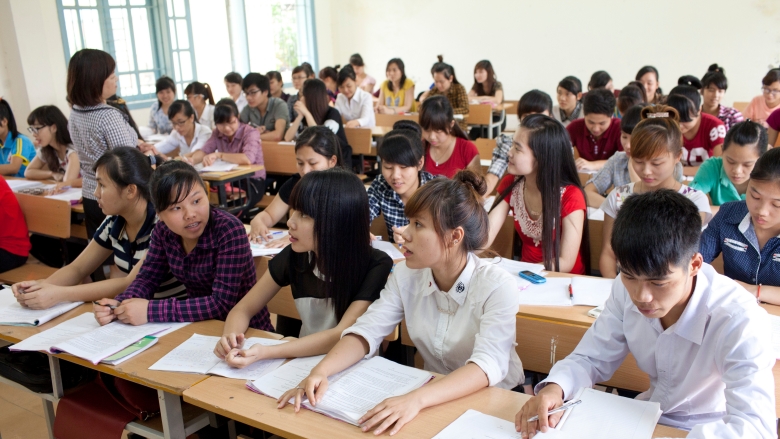This past summer, 860,000 students in Vietnam took the high-school leaving exam. Passing the exam certifies young people as having completed secondary education and paves their way for further education at the university level. However, more than 200,000 other students missed the opportunity to take this important exam because they did not have a chance to transition from lower to upper secondary school three years earlier.
One of the key goals outlined in the World Bank’s study, “Vietnam 2035: Toward Prosperity, Creativity, Equity, and Democracy”, is the achievement of universal secondary education completion. However, today, compulsory education in the country stops at the end of lower secondary school (9th grade). Every year, more than 200,000 students who graduate from lower secondary school cannot progress to upper secondary. Access to senior secondary school, and hence to university and potentially better employment, is rationed through exams developed and delivered at the provincial level. While some students who perform poorly on these exams may choose to continue with non-academic training or enter the labor market, research suggests that technical quality and alignment issues are also turning the exams into mechanisms that exclude willing learners from further education at age 15. Furthermore, the exams’ content, modality, and passing rates vary across provinces and may change every year.
In the 2016-2017 school year, nearly all 63 provinces in Vietnam required lower secondary school graduates to take the upper secondary entrance exam. The project, “Promoting Capacity for Fair, Aligned, and Effective Assessment”, under the READ 2 TF program supports the following activities for addressing quality and equity issues associated with these exams:
(i) Mapping the extent of their use;
(ii) Reviewing their alignment, technical quality, and utility as instruments to determine entry to academic Senior Secondary School;
(iii) Improving methods, both exam-based and non-exam based, for assessing student readiness for, and entry to, Senior Secondary and further education.
In the meantime, admissions offices in upper secondary schools in Vietnam have started accepting other forms of student assessment: “Now … a common way to select students is to use classroom assessment results and provincial exams. However, classroom assessments still need to be revised to better align with the measurement of student competencies”, says Dr. Nguyen Thuy Hong Van, Director at the Ho Chi Minh City University of Transport, who has served on committees for high-stake examinations in Vietnam for several years. Current classroom assessment practices mainly focus on measuring traditional mastery of factual content. The second component of the READ 2 TF project supports development and dissemination of classroom assessment tools that will measure a broader, more complex and more relevant range of student skills.
Vietnam is currently undergoing a major education reform, which includes renovation of the national curriculum to better support students in developing “21st century skills” and the ability to apply knowledge. The World Bank’s Renovation of General Education project (which supports the reform) and the second component of Vietnam’s READ 2 TF project are both supporting the development of new learning outcome standards and competencies that align with this reform. READ 2 specifically supports technical development of new and aligned classroom assessment tools through:
(i) Assisting with the development and piloting of systematic criteria for improved classroom assessment of reading progress, including the creation of a range of reliable indicators of performance levels consistent with the revised curriculum (currently, there is no standard definition of “reading levels” for students in Vietnam);
(ii) Assisting with the development and piloting of more reliable and standardized classroom assessment instruments to gauge student abilities in writing, listening, and speaking;
(iii) Training a cadre of “lead teachers” in the use of pedagogies and techniques compatible with, and informed by, these new assessment tools.
Vietnam’s READ 2 TF project team is working closely with the Vietnamese Government, local policymakers, and specialists in student assessment to improve examination and classroom assessment quality and, consequently, overall learning outcomes. This will open up more opportunities for Vietnamese youth for further education and help improve the quality of their lives.


